Early this week, I sent an SMS text to Lar Mohammed, the spokesperson of the Action Congress (AC) party. It was in response to what was reported in the media as the position of his party, on a new debate about the desirable number of political parties for Nigeria. According to THE PUNCH newspaper of Friday, December 26, 2008, it found out that many leading individuals within the Nations’s political elite, favoured the reduction of the number of political parties in the country, among them, it counted Lai Mohammed. It was on the basis of what was said to be the position of the AC, that I sent the SMS text to him, and in fairness to Lai Mohammed, he promptly called me back to explain his perspective about the new controversy, kite flying or muted debate; call it what you will. According to the account in THE PUNCH, Lai Mohammed had told the paper, that his AC party “was in support of reducing the number of parties, because the two party arrangement had succeeded in the part (he failed to mention that is was imposed by the military regime of General Babangida). Mohammed went further that “we quite support fewer parties but whether it will be four, five or any other number should be thrown open to Nigerians to debate”. Some of the other advocates of the constriction of the nation’s multiparty political space included the chairman of the Progressive People’s Alliance, Mister Clement Ebri; chairman House of Representatives’ Committee on the Air Force, Halims Agoda; deputy chairman, House Committee on Media and Publicity, Labaran Dambatta. Not to be left out of the debate and on the side of those who want a reduction in the number of political parties in Nigeria was Chief Edwin Ume-Ezeoke, the chairman of the All Nigeria People’s Party, ANPP, Chief Ume-Ezeoke, according to the report “argued that reducing the number of parties would straighten (SIC) the democratic process”. The old chief in fact reminded the reporter that the position asking for the reduction of parties “was contained in the party’s memorandum to the [Uwais] reform committee. Furthermore Chief Edwin Ume-Ezeoke added with fervor, that “we support the stand of the Uwais panel because it would help in strengthening Nigeria’s democratic process. If a two party system would be adopted, there must be provision for independent candidacy”. Mister Clement Ebri, a former governor of Cross River State, argued in words similar to Ume-Ezeoke, by stating that “if we must adopt the two-party system, then there must be independent candidacy. It should not be done with fiat, but by gradual evolution”. Agoda of the House of Representatives stated that the country lost focus with the large number of parties and that was not good for Nigeria. “Some of them (the parties) are just there to collect the stipend that is prescribed by the constitution to be given to political parties: very many of them have no offices even in a Abuja”. Halim’s Agoda is particularly unhappy about the scenario, and then added that “we are just making nonsense of multiplicity of parties; we have to build a system that is there to guarantee opposition and reach out to the grassroots”. As if that was not enough, Agoda reminded that “many of them (want) to join Government of National Unity for the purposes of getting the crumbs”. His colleague, Dambatta said parties should be reduced, “if there is no funding from government, the number of parties will shrink;….” The group seeking the constriction of the nation’s multiparty space was opposed by Alhaji Abdulkadir Balarabe Musa, of the People’s Redemption Party (PRP). He vowed that his party would do everything to scuttle a constitutional constriction of the multiparty space, because the argument for multiparty democracy has been won in the Supreme Court as well as through the Constitution. “In a democracy, the way I understand it”, said Musa, “political parties evolve. Our constitution as it is today says citizens have the right of association and to hold and disseminate opinion which includes the right to belong to a political party. I believe parties should be allowed to evolve, exist or disappear naturally” So why do we have the new debate in the light of the ruling rom the Supreme Court? Alhaji Abdulkadir Balarabe Musa said there is a sinister agenda at its base; “the whole idea is to make sure that the PDP lasts forever”! But the question to ask is what is it about the constriction of the political space, that will unite Lai Mohammed of the AC and Edwin Ume-Ezeolke of the ANPP? Why is a section of the nation’s political elite so uncomfortable with the idea of a multiplicity of political parties in Nigeria? It is important to remind those who feel threatened by an open political space that even under colonialism in the nineteen fifties, the space for the formation of political parties was not hedged by the colonialists. It was for that reason that we had very big and equally very small parties with all manners of agenda during the First Republic. Even then, there was the typically boisterous political horse trading, which led to the mergence of two broad political coalitions, NNA and APGA, during that period. The emergence of those coalitions did not sweep away the right to exist on the sidelinge, of the small political parties, I remember that other existed in the 1960s small parties of the left like the Nigerian Labour Party and the Socialist Workers and Farmers’ Party; even parties like Ilorin Talaka Parapo or the Igbirra Tribal Party all had the right to exist. The constriction of the political space, with absurd requirements for the registration of so-called national parties, was a legacy of military dictatorship. In the Obasanjo transition of 1978, it was made mandatory to pass very stringent requirements to get registered, and since it was only members of the nation’s bourgeoisie that could met those requirements, parties which emerged, tended to represent their interest, with the exception of the PRP. The Babagida period even cancelled all the steps taken to register parties, and by military fiat, formed two parties, the NRC and the SDP. It was this period of military fiat which Lai Mohammed referred to, when he said that we had a two a party system in the parts. Of course, that example is not one to commend to a society willing to deepen the content of its democracy. We should continue to fight for a genuinely open and multiparty democratic society, which all this parties to be formed without restriction. If we will have ballot papers the length of Nigeria so be it; that is the sacrifice we must make for democracy. The Indian ballot paper is said to be very long, because it practices a genuinely multiparty system which allows national, regional and local parties to emerge and contest the democratic space. To ensure that the logistic nightmare does not overwhelm the electoral system, it also put in place very responsible electoral machinery. This is what a big country like Nigeria should be attempting to implement within the realities of our country, not to hearken to the calls of the malcontents of multiparty democracy. Similarly, we should also insist that political parties are financed by the subscription of its membership and not through the funding of the state. Lai Mohammed told me something instructive about party funding; he said that even if a party got ten million naira, it might still end up spending ten times that amount. In the context of Nigeria, the big political parties squeeze money from the coffers of the state or as we have seen since the Obasanjo period, get big businessmen linked to the ruling party to donate billions of naira to perpetuate the hegemony which has led to the gradual destruction of every facet of our national life. The great parties of the twentieth century; communist, socialist, national liberation parties were funded by the subscription of their members. The new trend of state funding is a corrupt system and should be dropped if we are desirous of a genuinely responsive party system. The malcontents of multiparty democracy are using an aspect of the report of the Uwa is committee as if it was some special instrument that is superior to the constitution. Nigerians have made far more sacrifices to end dictatorship and will not now submit to any effort to constrict the political space in our country. We must never accept any effort to reduce political parties by fiat; parties should evolve in response to the realities in our country, and as the Chinese say, we should allow a thousand flowers bloom! It should be possible to have national parties side by side with regional and even local parties that might be interested only in winning power in one or a group of local governments. This is the deepening of the political process which Nigerian deserves, not the neo-fascist intention to monopolize the political space by the political merchants holding our country to ransom at the moment.
In solidarity with the Palestinian people.
Since the weekend, we have witnessed on international television, the bombardment of the Gaza Strip, by the armed forces of the Zionist state of Israel. The collective punishment of the Plaestinian people, by Israel has led to the death of hundreds of people, including men, women and children. As usual, the leaders of the Western imperialist countries, especially the United States and Britain, have endorsed the actions of the Zionists. Unfortunately, the Arab dictatorships that service on the basis of American support, have all but endorsed the actions of the Zionists much to the anger of the overwhelming majority of the Arab people and people around the world. The main imperialist media outlet have also become the mouth piece of Israeli aggression. A desperate effort is made to cast Israel as the victim, as if the world does not know that it is Israel which occupies the land of the Palestinian people. Let us express solidarity with occupies of Palestine; as a parent, it tears my heart to see the sufferings of the children of Palestine and the immoral acquiescence of the main imperialist powers in the crimes of the Zionists.


